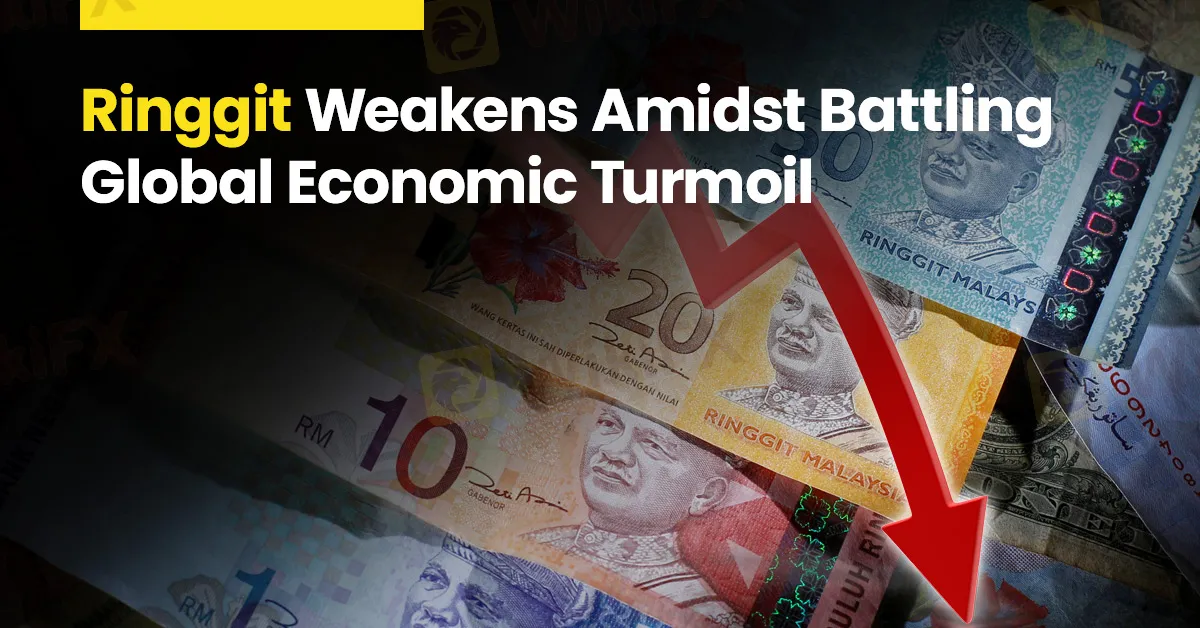简体中文
繁體中文
English
Pусский
日本語
ภาษาไทย
Tiếng Việt
Bahasa Indonesia
Español
हिन्दी
Filippiiniläinen
Français
Deutsch
Português
Türkçe
한국어
العربية
Ringgit Weakens Amidst Battling Global Economic Turmoil
Abstract:On Tuesday, the ringgit dipped to a low of 4.7900 against the US dollar, driven by apprehensive investors seeking refuge in the safe haven currency amidst escalating geopolitical tensions. Over the past week, the local currency has depreciated by nearly 0.9% against the US dollar, marking its weakest performance since January 1998. In conjunction with this decline, Bank Negara Malaysia has reiterated its commitment to bolstering the ringgit.

Bank Negara Malaysia has reiterated its commitment to bolstering the ringgit, which has neared its lowest point since January 1998. The central bank pledges to maintain the smooth operation of the foreign exchange market, with assistance from government-linked entities, corporations, and exporters. Their collective efforts aim to attract inflows and enhance liquidity within the market, as stated in a release from the central bank on Monday.
On Tuesday, the ringgit dipped to a low of 4.7900 against the US dollar, driven by apprehensive investors seeking refuge in the safe haven currency amidst escalating geopolitical tensions. Over the past week, the local currency has depreciated by nearly 0.9% against the US dollar.

This scenario is not unique to Malaysia. Investors are closely monitoring emerging-market central banks, including those of China, Korea, Thailand, Poland, and Indonesia, for potential intervention, as their local currencies have been battered by the recent surge in the dollar. In comparison, the ringgit demonstrated relative resilience compared to other regional currencies like the South Korean won, Philippine peso, and Taiwanese dollar.
Malaysia's currency struggles are part of a broader trend influenced by the dollar's strength, fuelled by expectations of prolonged high interest rates by the Federal Reserve, along with safe-haven demand amid escalating tensions in the Middle East. Additionally, the subdued economic prospects for China, Malaysia's key trading partner, have exerted downward pressure on the ringgit.
In early March, Bank Negara Malaysia's announcement to encourage state-linked entities to repatriate foreign investment income and consistently convert it into the local currency helped the ringgit recover from its February lows.
Dr. Mohd Afzanizam Abdul Rashid, Chief Economist and Head of Social Finance at Bank Muamalat Malaysia Bhd, highlighted to Business Times that during times of economic uncertainty, the US dollar typically serves as a safe haven, leading forex traders to increase their allocations to it. He further elaborated that the US Federal Reserve's cautious approach towards reducing its benchmark interest rate is supported by recent economic data, such as the 0.7% month-on-month growth in Retail Sales, surpassing consensus estimates of 0.4%.
Despite these challenges, Malaysia's status as a net oil exporter could offer some relief. With Brent oil prices approaching $100 per barrel, there is still a possibility of support for the Malaysian currency from this front.

Disclaimer:
The views in this article only represent the author's personal views, and do not constitute investment advice on this platform. This platform does not guarantee the accuracy, completeness and timeliness of the information in the article, and will not be liable for any loss caused by the use of or reliance on the information in the article.
Read more

Webull Launches SMSF Investment Platform with Zero Fees
Webull introduces commission-free SMSF trading, offering over 3,500 US and Australian ETFs, with no brokerage fees and enhanced portfolio tools.

Australian Authorities Joins Forces with Philippine Authorities to Combat Cyber Scams
AFP tackles cyber scam boiler rooms in the Philippines, training police to fight fraud and protect Australians from romance and cryptocurrency scams.

Steam Set to Launch Blockchain Game “Paradise” Amid Scam Allegations
“Paradise,” a blockchain-based game accused of being a crypto scam, is set for release on Steam, sparking concerns over platform’s ban enforcement and consumer risks.

Coinbase Phishing Scams Drain $46M from Users in Two Weeks
Coinbase phishing scams cost users $46M in two weeks. Learn how scammers target the crypto exchange and tips to stay safe.
WikiFX Broker
Latest News
How Crypto Trading Transforms FX and CFD Brokerage Industry
FCA Warns Against 10 Unlicensed or Clone Firms
CySEC Warns Against 14 Unlicensed Investment Websites
Top Currency Pairs to Watch for Profit This Week - March 31, 2025
Will natural disasters have an impact on the forex market?
Philippines Deports 29 Indonesians Linked to Online Scam Syndicate in Manila
Exposing the Top 5 Scam Brokers of March 2025: A Closer Look by WikiFX
Gold Prices Climb Again – Have Investors Seized the Opportunity?
Webull Launches SMSF Investment Platform with Zero Fees
Australian Regulator Warns of Money Laundering and Fraud Risks in Crypto ATMs
Currency Calculator








